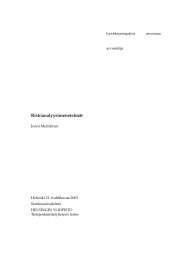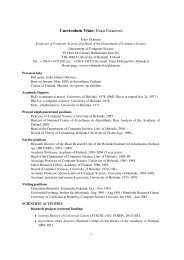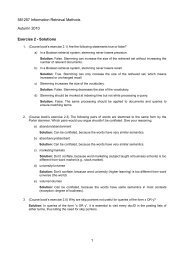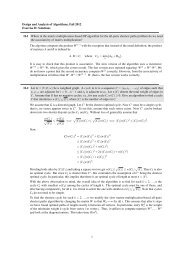Toni Sihvonen (order #92780) 62.142.248.1
Toni Sihvonen (order #92780) 62.142.248.1
Toni Sihvonen (order #92780) 62.142.248.1
Create successful ePaper yourself
Turn your PDF publications into a flip-book with our unique Google optimized e-Paper software.
<strong>Toni</strong> <strong>Sihvonen</strong> (<strong>order</strong> <strong>#92780</strong>) 6<br />
In return, a lord must be generous. He must furnish heorthgeneats<br />
and other dependents with room and board,<br />
steeds, armor and weapons. He must give worthy gifts to<br />
allies and diplomats. Above all, he must redistribute loot<br />
among his men, so that each man gets a little, and the<br />
best men get a lot.<br />
A generous leader will be praised as a beahgifa (“ringgiver”),<br />
his chair is a gifstohl (“gift-seat”) and his hall a<br />
hringsele (“ring-place”). But a lord who keeps more than<br />
half the plunder for himself will lose followers, while a<br />
follower who withholds his loot will face his lord in<br />
court. Both will earn a bad name. [New Trait and<br />
Passion rules - Penalty for Refusing to Share: page<br />
123. Glory Awards - Gifts: page 1271<br />
Tkade<br />
Saxons consider trade a noble activity. As noted under<br />
“Rank,” a ceorl who trades skillfully can be ennobled as a<br />
thegn. While Saxon farmsteads are nearly self-sufficient,<br />
ceorls still need simple luxury goods, metals, and spices:<br />
nobles need all that and more. Although Germanic invasions<br />
have disrupted Roman currency and trade networks,<br />
the Germans have established their own barter<br />
routes on the North Atlantic and Baltic, stretching from<br />
the distant lands of Wends and Slavs, through Denmark,<br />
to Dublin, Eburacum, and the Saxon Shore.<br />
Saxon warriors turn to barter when it offers more gain for<br />
less risk than raiding. Yet they remain warriors, whose<br />
bargaining favors the better-armed party. Such trade -<br />
less “free market” than “black market” - is fraught with<br />
tension and incipient violence. It can be civilized a bit by<br />
exchanging hostages, or trading under the eyes of a Just<br />
king. [Market Prices: page 1291<br />
Saxon Flaws<br />
Hengist’s Saxons were an army of poor but well-armed<br />
and desperate warriors turned loose in a country of rich,<br />
ill-defended cities and farms. They overran that country<br />
and eclipsed its native culture more thoroughly than did<br />
the Romans. Common sense - and not just the evidence<br />
of cities left to ruin, civilians enslaved, trade and<br />
Christianity smothered, and Latin literacy ignored - tells<br />
us that the first Saxons in Britain were a ruthless bunch.<br />
Cruel Saxons<br />
The Cruel trait is a point or two higher among Saxons.<br />
Even Saxons who avoid excessive cruelty are still callous<br />
compared to Arthur’s knights. Visitors to Saxon lands may<br />
see horses ridden to death, slaves treated worse than<br />
horses, body parts taken as trophies, and other examples<br />
of the Cruel trait in action. Saxons even boast about their<br />
dark deeds. The occasional finger or hand sacrificed for<br />
rune-lore shows that the Saxons are Cruel even to themselves.<br />
Truly Cruel Saxons<br />
God help the Christians captured by a truly Cruel Saxon,<br />
like Sir Turquine of the Dolorous Tower. They may be tortured<br />
and raped for amusement, then bound and thrown<br />
to wolves, bears, or snakes. They may be crucified in a<br />
parody of Christ or Wotan, or have their ribs cracked<br />
open and their lungs flung out, in the sacrifice of the<br />
Blood-Eagle (a cliche of the Vikings, but a favorite of the<br />
author). Such sadists are feared by other Saxons and will<br />
likely end up as nithings - as soon as they are no longer<br />
needed against the Britons, that is.<br />
Greedy Saxons<br />
Pendragon knights are not out for financial gain. Many<br />
players do not keep track of money, which is just as well,<br />
since money is beneath the notice of a real knight. This<br />
helps distinguish Pendragon from the “hack ‘n slash, grab<br />
‘n run” mentality of first-generation role-playing games.<br />
The Saxons, however, play by those old rules. Loot draws<br />
them into British lands, and the promise of dragon-hoards<br />
and magic weapons sends them into the Otherworld.<br />
Invading a keep - or a less defended place - killing its<br />
inhabitants, and running away with their treasure is a<br />
worthy adventure for a band of<br />
thegns. Saxons should keep track of their money, both as<br />
an index of success and to pay the gesith-gifts and<br />
wergilds that go along with it.<br />
Slave-taking Saxons<br />
Slavery is universal in fifth century Europe. By the Apogee<br />
phase of King Arthur’s reign it has vanished from Logres<br />
and is waning in other lands where Arthur has influence.<br />
Slaves are replaced by the peasants, who are in many<br />
ways equally powerless - yet they are not laboring animals<br />
to be hurt or killed, bought or sold, and raped or<br />
bred at their owner’s whim. Between Arthur’s moral<br />
leadership, the rise of serious Christianity, and the bitter<br />
memory of “Welsh” enslavement by Saxons, player<br />
knights can gain an ahistorical dread of slavery. Knights<br />
with kinfolk in Saxon captivity have an especially good<br />
reason to Hate (Saxons).
















